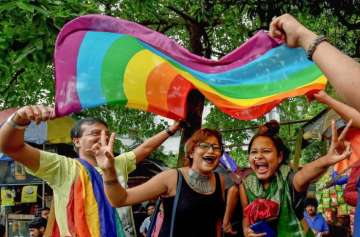Same sex marriage: HC seeks Centre's response on plea to allow foreign-origin spouse to apply for OC
The Delhi High Court on Tuesday sought response from the Centre and the Consulate General of India, New York, on a petition to allow a foreign-origin spouse of an Overseas Citizen of India cardholder to apply for OCI registration regardless of gender or sexual orientation.

The Delhi High Court on Tuesday sought response from the Centre and the Consulate General of India, New York, on a petition to allow a foreign-origin spouse of an Overseas Citizen of India cardholder to apply for OCI registration regardless of gender or sexual orientation.
The petition seeks a declaration that the right to legal recognition of the same-sex marriage is a fundamental right under Articles 14, 15, 19 and 21 of the Constitution irrespective of a person's gender, sex or sexual orientation.
All same-sex or queer marriages be legally recognized in India under the applicable statutes, rules and policies that are in force, it said.
A bench of Chief Justice D N Patel and Justice Jyoti Singh issued notice on the petition and listed it for further hearing on August 27 along with other pleas seeking recognition of same sex marriage under Hindu, special and foreign marriage acts.
The petitioners are a married same-sex couple -- Joydeep Sengupta, an OCI, and Russell Blaine Stephens, a US citizen -- and Mario Dpenha, an Indian citizen and a queer rights academic and activist pursuing a PhD at Rutgers University, USA.
In their petition filed through advocates Karuna Nundy, Ruchira Goel, Utsav Mukherjee, Ragini Nagpal and Abhay Chitravanshi, the three have informed the Court that Sengupta and Stephens been in a loving relationship for nearly 20 years and even got married in New York on August 6, 2012 which is recognised in the US, France, and Canada.
The couple is now preparing for their new role as parents as they are expecting their first child in July 2021, it added. Since Stepens wished to apply for OCI status under Section 7A(1)(d) of the Citizenship Act in order to be entitled to multiple entry lifelong visa for visiting India, the couple approached Dpenha to file RTI applications to ascertain the legal position on Stephen's eligibility.
The three decided to move the high court after “the Ministries kept transferring the RTIs back and forth” and no effective response was received. “The petition seeks that the Foreign Marriage Act and Special Marriage Act be read in accordance with the Constitution of India.”, Nundy told the Court.
The petition states that “a marriage like that of Petitioners Nos.1 and 2 (the couple), being validly registered under US law, must necessarily meet the requirements of the term 'registered' under Section 7A(1)(d) of the Citizenship Act”.
It is asserted that “conceptions of family and kinship under law should recognise communities of people who may vary in their personal identities but live together in a shared experience of queerness and love to not participate in the compulsory heteronormative family”.
In the first petition on recognition of same-sex marriage, Abhijit Iyer Mitra and three others have contended that marriages between same-sex couples are not possible despite the Supreme Court decriminalising consensual homosexual acts and sought a declaration to recognise same-sex marriages under the Hindu Marriage Act (HMA) and Special Marriage Act (SMA).
The two other pleas are --- one filed by two women seeking to get married under the SMA and challenging provisions of the statute to the extent it does not provide for same-sex marriages and the other filed by two men who got married in the US but were denied registration of their marriage under the Foreign Marriage Act (FMA).
The petition filed by equal rights activists Mitra, Gopi Shankar M, Giti Thadani and G. Oorvasi contended that homosexual sex has been decriminalised by the apex court but same-sex marriages are still not being allowed under the provisions of the HMA.
“In this view of the matter, it can be stated that it is against the constitutional mandate of non-arbitrariness if the said right is not extended to homosexual apart from heterosexual couples,” said the petition, filed through Raghav Awasthi and Mukesh Sharma.
The two women, who were represented by senior advocate Maneka Guruswamy and lawyers Arundhati Katju, Govind Manoharan and Surabhi Dhar, have said in their plea that they have been living together as a couple for 8 years, in love with each other sharing the highs and lows of life, but unable marry as they are a same sex couple.
The women, aged 47 years and 36 years, have contended that not being allowed to get married has denied them several rights -- liking owning a house, opening a bank account, family life insurance -- which opposite sex couples take for granted.
The two men, also represented by the same set of lawyers, were married in the United States, but their marriage was not registered under the FMA by the Indian consulate as they were a same sex couple.
The couple, who were in a relationship since 2012 and got married in 2017, have also claimed that during the COVID-19 pandemic, non recognition of their marriage by the laws here continues to disentitle them to travel as a married couple to India.
Central government has opposed same-sex marriage on the ground that marriage in India is not just a union of two individuals but an institution between biological man and woman. It also said that judicial interference will cause "complete havoc with the delicate balance of personal laws".
Any interpretation other than treating a husband as a biological man and a wife as a biological woman will make all statutory provisions unworkable, it said, adding that marriage is essentially a socially recognized union of two individuals which is governed either by uncodified personal laws or codified statutory laws.